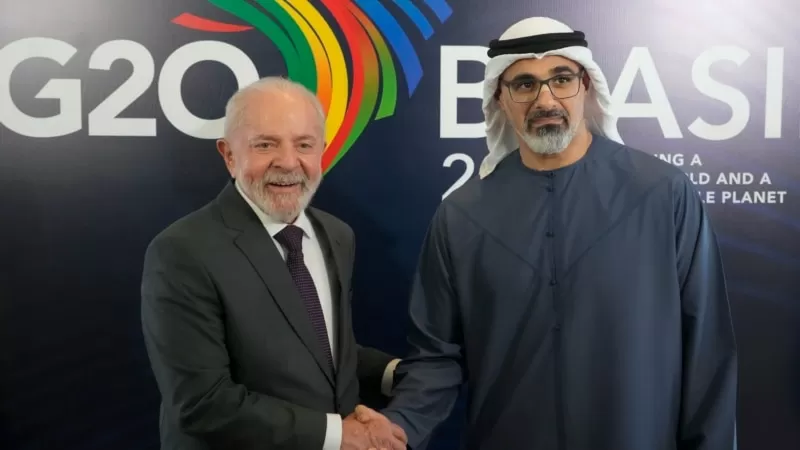Middle East analysts are praising a series of agreements reached at the recent summit of the 20 biggest economies in Brazil, highlighting the potential for Gulf Cooperation Council (GCC) states to strengthen economic relations with emerging markets in Latin America. These agreements, signed by Crown Prince Khaled bin Mohamed bin Zayed of the United Arab Emirates and Brazilian President Luiz Inacio Lula da Silva, open new avenues for cooperation between the two regions.
The first memorandum of agreement, aimed at promoting UAE investments in strategic sectors in Brazil, is a significant step towards increasing economic ties between the two countries. Additionally, a second memorandum of agreement between the foreign ministries of the UAE and Brazil calls for cooperation in Africa, further expanding the scope of their partnership.
Meanwhile, Saudi Arabia also made progress in strengthening its ties with Brazil, signing a memorandum of agreement to establish the Saudi-Brazilian Coordination Council. This council will facilitate cooperation in various sectors including economic, diplomatic, and strategic areas, benefiting both countries.
These agreements build on the strong and established relationship between the GCC states and Brazil. As a major agricultural exporter, Brazil’s efforts to address global food insecurity align with the GCC’s need for vital agricultural imports like meat, cereals, and coffee. At the same time, the Gulf countries offer Brazil important resources such as phosphate, aluminum, and oil.
Currently, Brazil is the GCC’s largest trading partner in Latin America, followed by Mexico and Argentina. In 2022, over 70% of Brazil’s exports to Arab countries were agricultural products, demonstrating the potential for further economic cooperation between the two regions. Zubair Iqbal, a nonresident scholar at the Middle East Institute and former International Monetary Fund official, believes that Brazil offers promising opportunities for trade and investment for the GCC states. However, tangible progress towards enhanced cooperation will depend on bilateral agreements rather than multination initiatives.
According to recent data, GCC countries, particularly the UAE and Saudi Arabia, have been expanding their investment footprint in Latin America, with a total investment of $4 billion between 2016 and 2021. The UAE’s sovereign wealth fund, Mubadala, has played a crucial role in this, investing over $5 billion in Brazil since the early 2010s. Notable projects include an oil refinery, a toll road, and collaborations with Brazil’s largest biofuel producer. Mubadala plans to invest an additional $1 billion annually in Brazil, demonstrating their confidence in the country’s potential.
Additionally, UAE-based JFR Investments, owned by an Angolan businessman, has signed significant mining agreements in Brazil and Peru since 2022. Similarly, Dubai-based DP World manages port infrastructure across Latin America, further strengthening trade and investment ties between the two regions.
Saudi Arabia’s Public Investment Fund (PIF) is also deepening its ties with Latin America. In June 2024, PIF hosted a conference in Rio de Janeiro where they announced $15 billion in planned projects for Brazil. In August 2023, Saudi Investment Minister Khalid Al-Falih visited seven Latin American countries to explore opportunities in various sectors such as mining, food processing, agriculture, transport, healthcare, entertainment, pharmaceuticals, and biotechnology. Previous Saudi investments in the region include the acquisition of Chilean fuel retailer Esmax by Saudi Aramco and a $500 million investment by the Saudi Fund for Development in an Argentine gas pipeline.
Kevin Funk, a political economist specializing in Latin America, believes that Brazilian companies are also showing a growing interest in investing in the Gulf as the region diversifies its economy away from dependence on oil. A range of large and small Brazilian businesses are now operating in the Gulf countries, in sectors such as food, clothing, and cosmetics. For example, Sao Paulo-based JBS, the world’s largest meat processor, has established a significant presence in the Gulf.
However, while the interregional relationship between the Gulf and Latin America is strong, it remains largely focused on trade in primary products such as agricultural goods and minerals. Brazil’s reliance on Gulf fertilizers has grown, partially due to supply chain disruptions caused by Russia’s invasion of Ukraine. Nonetheless, domestic challenges in Latin America such as slow economic growth, political instability, and inequality have hindered the region’s ability to prioritize interregional ties.
In conclusion, the recent summit in Brazil of the 20 biggest economies has opened doors for increased cooperation between the Gulf Cooperation Council states and Latin America. The agreements signed during


